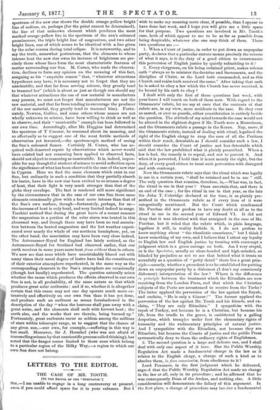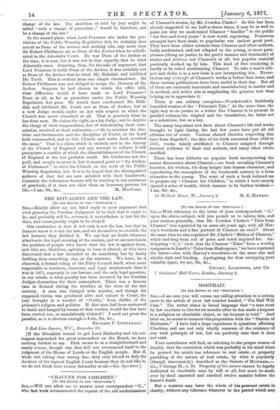LETTERS TO THE EDITOR.
wish to make my meaning more clear, if possible, than I appear to have done last week, and I hope you will give me a little space for that purpose. Two questions are involved in Mr. Tooth's case, both of which appear to me to be as far as possible from being despicable, whatever else one may think of them. These two questions are :— 1. When a Court of justice, in order to put down an unpopular party, declares that a particular statute means precisely the reverse of what it says, is it the duty of a good citizen to countenance this perversion of English justice by quietly submitting to it?
2. Every clergyman, on his being ordained priest, makes solemn oath "always so to minister the doctrine and Sacraments, and the discipline of Christ, as the Lord bath commanded, and as this Church and realm bath received the same." After taking that oath he is asked to obey a law which the Church has never received, is he bound by his oath to obey ?
I dealt with only the first of these questions last week, with your leave I will touch on both of them now. With regard to the Ornaments' rubric, let me say at once that the contents of that rubric are, in my view, mere accidents in the case. Be they ever so sacred, or ever so puerile, either consideration is entirely beside the question. The attitude of my mind towards the case would not be altered in the slightest degree if Mr. Tooth were a Mussulman, and the Ornaments rubric a passage in the Koran. Nay, more, if the Ornaments rubric, instead of dealing with ritual, legalised the right of the English clergy to crop the ears of all the Puritans within their reach, detestable as I should consider such a law, I should consider the Court of justice not less detestable which said that the law prohibited what it plainly prescribed. When a law is bad, the remedy is to repeal, and not to pervert it. And when it is perverted, I hold that it is not merely the right, but the duty, of every good citizen to treat such perversion with disregard and with contempt.
Now the Ornaments rubric says that the ritual which was legally in use in a certain year, "shall be retained and be in use " still.
The only question that remains, therefore, is,—What was, in fact, the ritual in use in that year ? Once ascertain that, and there is an end of the case ; for the ritual in use in that year, as the late Sir John T. Coleridge declared at the time, is as plainly pre- scribed in the Ornaments rubric as if every item of it were categorically mentioned. But the Court which condemned Mr. Purchas did nor profess to have any doubt at all as to the ritual in use in the second year of Edward VI. It did not deny that it was identical with that arraigned in the case of Mr.
Purchas, but it ruled that the rubric which, in plain language, legalises it still, in reality forbids it. I do not profess to know anything about "the ritualistic conscience," but I think I know something of my own, and I believe that I attest my loyalty to English law and English justice by treating with contempt a judgment which is a gross outrage on both. Am I very stupid, or is the Spectator, usually so clear-headed and high-minded, so
blinded by prejudice as not to see that behind what it treats so scornfully as a question of "petty detail" there lies a great prin-
ciple—namely, whether a precedent is to be established for putting down an unpopular party by a dishonest (I don't say consciously dishonest) interpretation of the law ? Where is the difference in principle between the treatment which the Ritualists are now receiving from the London Press, and that which the Christian subjects of the Porte are accustomed to receive from the Turks ? The latter applaud the perversion of the law against the Rayah, and exclaim, "He is only a Giaour !" The former applaud the perversion of the law against Mr. Tooth and his friends, and ex- claim, "They are only Ritualists." I sympathise with the rayah of Turkey, not because he is a Christian, but because his life, from the cradle to the grave, is embittered by a galling despotism, which tramples under foot the elementary rights of humanity and the rudimentary principles of natural justice. And I sympathise with the Ritualists, not because they are Ritualists, but because the Courts of justice and the public Press systematically deny to them the ordinary rights of Englishmen.
2. The second question is a large and delicate one, and I shall deal with only one aspect of it here. Has the Public Worship Regulation Act made a fundamental change in the law as it relates to the English clergy, a change of such a kind as to absolve them, in foro conscientix, from obedience to it ?
Lord Penzance, in the first judgment which he delivered, argind that the Public Worship Regulation Act made no change in the law at all, only in its procedure ; and he affirmed that he was consequently Dean of the Arches, and nothing else. A little consideration will demonstrate the fallacy of this argument. In the first place, a change of procedure may involve a fundamental change of the law. 'The abolition of trial by jury might be called "only a change of procedure ;" would it, therefore, not be a change of the law ?
In the second place, when Lord Penzance sits under the pro- visions of the Public Worship Regulation Act, he certainly does not sit as Dean of the Arches, and nothing else, any more than Sir Robert Phillimore sat as Dean of the Arches when he adjudi- cated in the Admiralty Court. He was Dean of the Arches at the time, it is true, but it was not in that capacity that he tried Admiralty cases. Granting, then, for the sake of argument, that Lord Penzance is really Dean of the Arches, it was certainly not as Dean of the Arches that he tried Mr. Riflsdale and inhibited Mr. Tooth. This is evident from one simple circumstance. Sir Robert Phillimore was not obliged to resign the Deanery of the Arches. Suppose he had chosen to retain the office still, what difference would it have made to Lord Penzance ? None at all, as far as procedure under the Public Worship Regulation Act goes. He would have condemned Mr. Rids- dale and inhibited Mr. Tooth not as Dean of Arches, but as a new Judge would, under an Act with respect to which the Church was never consulted at all. That is precisely what he has done now. He claims the right, as a lay Judge, not to deprive the clergy of their temporalities, but of withdrawing their com- mission, received at their ordination,—" So to minister the doc- trine and Sacraments, and the discipline of Christ, as the Lord bath commanded, and as this Church and realm bath received the same." That is a claim which is entirely new in the history of the Church of England, and any attempt to enforce it will precipitate a conflict of which the disestablishment of the Church of England is the too probable result. Mr. Gladstone saw the peril, and sought to avert it, but it seemed good to "the wisdom of Parliament" to drive the Church on the reefs of the Public Worship Regulation Act. It is to be hoped that the distinguished authors of that Act are now satisfied with their handiwork. Certainly the Liberation Society will be wanting in any sentiment of gratitude, if it does not elect them as honorary patrons for










































 Previous page
Previous page